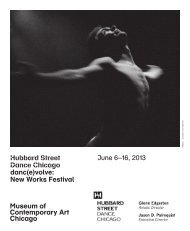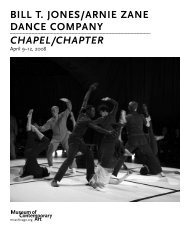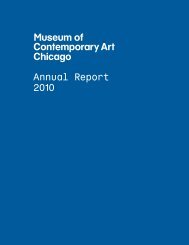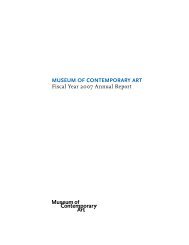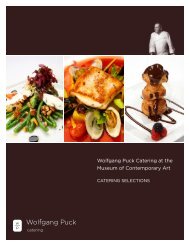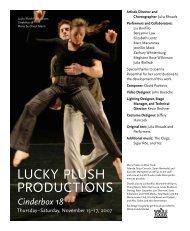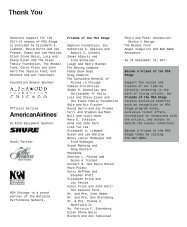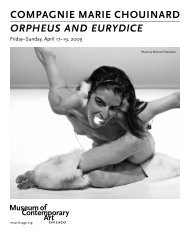Program Notes - Museum of Contemporary Art Chicago
Program Notes - Museum of Contemporary Art Chicago
Program Notes - Museum of Contemporary Art Chicago
Create successful ePaper yourself
Turn your PDF publications into a flip-book with our unique Google optimized e-Paper software.
Photo: Julieta Cervantes<br />
eighth blackbird<br />
with Nico Muhly<br />
and Bryce Dessner<br />
Tuesday and Wednesday,<br />
April 30 and May 1, 2013<br />
Edlis Neeson<br />
Theater
eighth blackbird<br />
Photo: Luke Ratray<br />
Photo: Jeff R<strong>of</strong>fman<br />
<strong>Art</strong>ists Up Close<br />
Gain insight into the creative process through<br />
these intimate opportunities to engage with<br />
the artists.<br />
First Night<br />
Tue, Apr 30<br />
Following the first concert, join us for<br />
a conversation with the performers<br />
and composers moderated by Peter Taub,<br />
Director <strong>of</strong> Performance <strong>Program</strong>s.<br />
CD signing<br />
Wed, May 1<br />
Meet composer David Lang. After the concert,<br />
the artist signs CDs <strong>of</strong> his new release, death<br />
speaks (Cantaloupe), his project exploring art<br />
song with Bryce Dessner (guitar), Nico Muhly<br />
(piano), Owen Pallett (voice, violin), and Shara<br />
Worden (voice, bass drum.)<br />
Lang found inspiration for death speaks in<br />
Franz Schubert’s lieder, particularly in the texts<br />
for such songs as “Death and the Maiden” and<br />
“Die schöne Müllerin.” Lang’s libretto draws from<br />
thirty-two different songs, including two that the<br />
artists perform as part <strong>of</strong> the eighth blackbird<br />
engagement.<br />
EIGHTH BLACKBIRD<br />
with Nico Muhly and Bryce Dessner<br />
Shara Worden, soprano<br />
Bryce Dessner, electric guitar<br />
Nico Muhly, toy piano and<br />
electric organ<br />
eighth blackbird<br />
Tim Munro, flute<br />
Michael J. Maccaferri, clarinet<br />
Yvonne Lam, violin and viola<br />
Nicholas Photinos, cello<br />
Matthew Duvall, percussion<br />
Lisa Kaplan, piano<br />
Tristan Perich<br />
qsqsqsqsqqqqqqqqq (2009)<br />
for three toy pianos<br />
and electronics<br />
Nico Muhly<br />
Doublespeak (2012)<br />
for sextet<br />
Lisa Kaplan<br />
whirligig (2013)<br />
for piano four hands<br />
World premiere<br />
1. <strong>of</strong>f-kilter<br />
2. merry-go-round<br />
3. boogie-woogie<br />
David Lang<br />
how to pray (2002/13)<br />
for sextet, electric organ,<br />
and electric guitar<br />
David Lang<br />
Songs from death speaks (2012)<br />
for soprano, electric guitar,<br />
piano and sextet<br />
1. you will return<br />
2. pain changes<br />
Intermission<br />
Bryce Dessner<br />
Murder Ballades (2013)<br />
for sextet<br />
US Premiere<br />
1. Omie Wise/Young Emily<br />
2. Dark Holler<br />
3. Wave the Sea/Brushy Fork<br />
4. Pretty Polly/<br />
Tears for Sister Polly<br />
Philip Glass<br />
Two Pages (1968)<br />
for sextet, electric guitar,<br />
and electric organ<br />
Steve Mackey<br />
Lonely Motel (2008/12)<br />
for sextet and electric guitar<br />
This performance runs<br />
approximately 110 minutes,<br />
with intermission.<br />
Bryce Dessner’s Murder Ballades<br />
is commissioned by eighth blackbird<br />
and Lunapark and funded by the<br />
Doelen Concert Hall, Rotterdam,<br />
Muziekgebouw aan ‘t IJ, Amsterdam,<br />
and Muziekgebouw Frits Philips,<br />
Eindhoven, with the financial support<br />
<strong>of</strong> the Van Beinum Foundation,<br />
the Netherlands, with additional<br />
support from the <strong>Museum</strong> <strong>of</strong><br />
<strong>Contemporary</strong> <strong>Art</strong> <strong>Chicago</strong>.<br />
This program is partially supported<br />
by a grant from the Illinois <strong>Art</strong>s<br />
Council Agency through federal<br />
funds provided by the National<br />
Endowment for the <strong>Art</strong>s<br />
ILLINOIS<br />
A RTS<br />
COUNCIL<br />
A GENCY
Theater<br />
About the Music<br />
Back to Back Theatre<br />
Ganesh Versus<br />
the Third Reich<br />
May 16–19, 2013<br />
Presented as part <strong>of</strong><br />
Bodies <strong>of</strong> Work Festival<br />
“Courageous, confronting,<br />
intelligent and magisterially<br />
considered theatre…<br />
[a] towering achievement.”<br />
The Age (Australia)<br />
For tickets, visit mcachicago.org<br />
or call 312.397.4010.<br />
Generous support is provided by Lisa Yun Lee.<br />
Photo: Jeff Busby<br />
Tristan Perich<br />
qsqsqsqsqqqqqqqqq (2009)<br />
This piece was named after an excerpt <strong>of</strong><br />
commands I type when configuring my drawing<br />
machine, and is for a tightly synchronized canon<br />
<strong>of</strong> toy piano and electronic parts. Machines<br />
epitomize process, yet always there is a sensitive<br />
membrane between the electronic and the<br />
physical, the abstract and the real. It is to either<br />
side <strong>of</strong> this divide that we can skirt, loitering in the<br />
conceptual, dallying in the concrete. They call<br />
“muscle memory” what our bodies do without<br />
our minds intervening, fingers glittering above a<br />
keyboard. Machines can only dream <strong>of</strong> mistakes.<br />
There, where perfection turns imperfect and the<br />
imperfect gains perfection, is where our logic<br />
ends and the other begins. —Tristan Perich<br />
Nico Muhly<br />
Doublespeak (2012)<br />
This piece was written for eighth blackbird for<br />
the Music Now! festival in Cincinnati, in honor<br />
<strong>of</strong> Philip Glass’s 75th birthday. My mission in<br />
writing the piece was tw<strong>of</strong>old: first, to write 8bb<br />
the most fun piece possible for them, at just the<br />
right length. The second was to in some way tip<br />
my hat to Philip Glass, whom I admire broadly<br />
and deeply. eighth blackbird have played so<br />
much fast, loosely repetitive music over the<br />
years; I wanted to refine this kind <strong>of</strong> material into<br />
its purest, most delicious form and point back to<br />
the 70s, when classical music perfected obsessive<br />
repetition. The piece begins by applying<br />
an additive process to a small cell on the solo<br />
violin. This is the defining gesture <strong>of</strong> the piece<br />
and is subject to much variation. Occasionally,<br />
the busy textures give way to drones played by<br />
the soprano recorder, under which we begin<br />
to hear chords from Philip's insanely beautiful<br />
Music in Twelve Parts (1971-74). The piece<br />
unfolds in similar episodes: fast music <strong>of</strong>fset by<br />
slow, melancholic memories <strong>of</strong> the music <strong>of</strong> the<br />
late 1960s and 1970s (aren’t those the intervals<br />
from Violin Phase Was that a cell from In C).<br />
Towards the end <strong>of</strong> the piece, the language <strong>of</strong><br />
Music in Twelve Parts becomes more dominant<br />
and gradually overtakes all the busy material<br />
and the piece ends in a stylized dream-state.<br />
—Nico Muhly<br />
Lisa Kaplan<br />
Whirligig (2013)<br />
1. a toy that spins around, for example, a top<br />
or a pinwheel. Another term for merry-go-round<br />
2. a thing regarded as hectic or constantly<br />
changing : the whirligig <strong>of</strong> time.<br />
3. a small black predatory beetle that swims<br />
rapidly in circles on the surface <strong>of</strong> still or slowmoving<br />
water and dives when alarmed.<br />
I only like to play four hands piano with people<br />
I really like. This genre, with two players at one<br />
keyboard, should make you laugh and curse,<br />
and delight in invading each other’s space.<br />
(Otherwise, what's the point You might as well<br />
be playing on two separate instruments!)<br />
Nico Muhly and I wanted a four-hands piece to<br />
play together tonight and, rather than find an<br />
existing work, he dared me to write something.<br />
That dare was an inspiration.<br />
whirligig is all about getting up in each other’s<br />
business and relishing in it. The first movement,<br />
<strong>of</strong>f-kilter, is my tribute to Nico and his spunky,<br />
vibrant, and amazingly animated personality.<br />
merry-go-round is both silly wordplay and a<br />
homage to one <strong>of</strong> my favorite people.<br />
The third movement is an odd-metered
About the Music<br />
boogie-woogie that was stuck in my head<br />
the whole time I was writing whirligig,<br />
and I thought it would be great fun to play.<br />
—Lisa Kaplan<br />
David Lang<br />
how to pray (2002/13)<br />
The reason why the psalms are so central to<br />
religious experience is that they are a comprehensive<br />
catalogue <strong>of</strong> examples <strong>of</strong> how to talk<br />
to the Almighty, not by a prophet or a priest but<br />
in the voice <strong>of</strong> a single person out in the world,<br />
with problems and concerns not unlike those<br />
faced by real people in all times. Of course, it’s<br />
like reading one side <strong>of</strong> a correspondence—<br />
we can read David’s letters but the letters back<br />
are the ones we really want to see.<br />
I am not a religious person. I don’t know how to<br />
pray. I do, however, know some <strong>of</strong> the times and<br />
places and formulas that are supposed to make<br />
prayer possible. Sometimes I find myself sending<br />
those messages out. And then I wait, secretly<br />
hoping that I will recognize the response.<br />
My first thought for this piece was that I could<br />
somehow “borrow” my favorite running piano<br />
line from the beginning <strong>of</strong> Stravinsky’s<br />
Symphony <strong>of</strong> Psalms, bringing into the concert<br />
the piece that had introduced me to the idea<br />
<strong>of</strong> psalm setting, many years ago. More recently<br />
I have been setting the entire book <strong>of</strong> psalms,<br />
in an evening-length work for solo piano called<br />
psalms without words. I have been transcribing<br />
my own cantillation (liturgical setting) <strong>of</strong> the<br />
psalms—the rhythms, the accents, and the<br />
pacing <strong>of</strong> the Hebrew. I used a similar strategy<br />
to convert the prayer before saying the psalms<br />
into the music for how to pray. —David Lang<br />
David Lang<br />
death speaks (2012)<br />
Franz Schubert has a lot <strong>of</strong> songs with texts<br />
where Death is personified—I wondered if<br />
I assembled all <strong>of</strong> the instances <strong>of</strong> Death<br />
speaking directly to us then maybe a fuller<br />
portrait <strong>of</strong> Schubert’s character might emerge.<br />
Most <strong>of</strong> these texts are melodramatic, hyperromantic<br />
and over-emotional; one <strong>of</strong> the knocks<br />
on Schubert is that he <strong>of</strong>ten saved his best<br />
music for the worst poetry. Nevertheless, I felt<br />
that taking these overwrought comments by<br />
Death at face value just might lead me someplace<br />
worth going. death speaks was commissioned<br />
by Carnegie Hall and Stanford Lively<br />
<strong>Art</strong>s. —David Lang<br />
Bryce Dessner<br />
Murder Ballades (2013)<br />
When eighth blackbird asked me for a piece,<br />
I immediately knew what to do: let great American<br />
folk music inspire a great American new music<br />
ensemble. With this in mind I started to examine<br />
various strands <strong>of</strong> American music, both folk<br />
and classical, popular and sacred. Around the<br />
time I was working we had the horrible tragic<br />
shootings in Aurora and Sandy Hook and I<br />
started to think about the nature <strong>of</strong> violence<br />
in American Identity.<br />
The “murder ballad” has its roots in a European<br />
tradition, in which grisly details <strong>of</strong> bloody<br />
homicides are recounted through song.<br />
When this tradition came to America, it developed<br />
its own vernacular, with stories and songs<br />
being told and re-told over the generations.<br />
These ballads have long been central to the<br />
American folk tradition.<br />
In Murder Ballades I re-examine several <strong>of</strong><br />
these old songs, allowing them to inspire my<br />
own music. “Omie Wise,” “Young Emily,” and<br />
“Pretty Polly” are classic murder ballads, tales<br />
<strong>of</strong> romantically-charged killings that are based<br />
on real events. “Dark Holler,” my own composition,<br />
is loosely modeled on the clawhammer<br />
banjo style which would have accompanied<br />
many <strong>of</strong> these early folk songs. “Brushy Fork”<br />
is a Civil War era murder ballad/fiddle tune,<br />
and “Wave the Sea” and “Tears for Sister Polly”<br />
are original compositions woven out <strong>of</strong> the<br />
depths <strong>of</strong> the many months I spent inhabiting<br />
the seductive music and violent stories <strong>of</strong> these<br />
murder ballads. —Bryce Dessner<br />
Philip Glass<br />
Two Pages (1968)<br />
Composers, like all artists, struggle with what<br />
to title their works. Those avoiding creaky terms<br />
such as “symphony” and “concerto” may hint<br />
at a poetic world beyond the notes<br />
(...into the receding mist...) or throw a political<br />
grenade (Workers Union). Some will describe<br />
musical processes (Nico Muhly’s A Long Line)<br />
or attempt in-jokes (the percussion work,<br />
Having never written a note for percussion).<br />
In that company, the title "Two Pages” is either<br />
a unique departure or an indecisive cop-out:<br />
In Two Pages, quite simply, the musicians play<br />
from two printed pages <strong>of</strong> notes.<br />
Two Pages could last all night, into tomorrow,<br />
perhaps forever. Philip Glass’s early work is<br />
fast, stark, repetitive, hypnotic. The composer<br />
reduces the elements <strong>of</strong> music to their simplest<br />
forms, a radical move inspired by the static,<br />
meditative language <strong>of</strong> Indian classical music,<br />
but also a rejection <strong>of</strong> the complex, dissonant<br />
music by many <strong>of</strong> his contemporaries.<br />
Two Pages is single unison line <strong>of</strong> music, and<br />
can be played by any combination <strong>of</strong> instruments.<br />
—Tim Munro, flutist<br />
Steve Mackey<br />
Lonely Motel (2008/12)<br />
The music <strong>of</strong> Lonely Motel is drawn from Slide,<br />
a musical theater song cycle written by Steve<br />
Mackey with words by actor/singer Rinde Eckert.<br />
Commissioned and performed by eighth blackbird<br />
(with Mackey on guitar and Eckert singing),<br />
Slide is a character study <strong>of</strong> Renard, a lovelorn<br />
psychologist who reconsiders his 40 -year- old<br />
experiment utilizing photographic slides to challenge<br />
notions <strong>of</strong> perception and reality. The songs<br />
<strong>of</strong> Slide deal with themes <strong>of</strong> belief and self—<br />
delusion, and the loneliness created by the<br />
attachments we develop to our own fuzzy view<br />
<strong>of</strong> reality. Lonely Motel was the final song in the<br />
original show, and included the following text:<br />
“It's quiet here. This motel, uncomplicated, this<br />
simple room, controlled a measurable peace.<br />
And I sleep here like a baby, like a baby here<br />
I sleep.” —Tim Munro, flutist
Songs from death speaks<br />
“you will return”<br />
you will return to dust<br />
you till turn<br />
return to dust<br />
turn to the sun<br />
like me, turn to the sun<br />
turn to the light<br />
turn to the light<br />
If there's an eye still open<br />
grieving<br />
sweet sleep<br />
close it for me<br />
turn your heart, your poor heart<br />
it will only find rest<br />
when it has stopped beating<br />
turn to peace<br />
turn to peace<br />
this is the only road that leads you home<br />
enter<br />
I am your pale companion<br />
I mirror your pain<br />
I was your shadow<br />
all those long nights, all those days long past<br />
listen to me<br />
this message is for you<br />
where I am now, all sorrow is gone<br />
where I am now, all lovers are together<br />
where I am now<br />
in my arms only will you find rest<br />
gentle rest<br />
“pain changes”<br />
pain changes every shape<br />
once you are truly lonely<br />
you will never be alone<br />
feel my hand<br />
I feel you<br />
touch my cold hand<br />
I will take you<br />
from her<br />
to your new cold land<br />
I have chosen you<br />
my only love<br />
those others<br />
they search for you<br />
but<br />
where they search<br />
they will never find you<br />
after the leaves fall, spring returns<br />
after love is parted, it returns<br />
all you have to do is<br />
come with me<br />
and wait<br />
one day she will be lowered in the earth<br />
beside you<br />
my hand will guide her home<br />
to the place where love is<br />
and no pain<br />
when that door opens<br />
you will be healed<br />
dearest man, dearest woman<br />
dearest boy, dearest girl<br />
dearest mother, dearest father<br />
dearest son, dearest daughter<br />
you will never leave me<br />
you listen<br />
you are silent<br />
you feel me leaning towards you<br />
nothing escapes me<br />
not the warrior<br />
not the hunter<br />
everything awaits the way it changes<br />
when life falls away<br />
that is the meaning <strong>of</strong> the swan<br />
and its song<br />
the night can't last forever<br />
nor will this sleep<br />
beyond this sleep is light<br />
forever light<br />
until that light can shine<br />
until you see it shining<br />
sleep sweetly here<br />
in the cool, dark night
About the artists<br />
Bryce Dessner (b. 1976)<br />
is based in New York and is best known as the<br />
guitarist for the rock band the National and as<br />
a composer and guitarist for the improvising<br />
new music quartet Clogs. He has performed<br />
and recorded with musicians Sufjan Stevens,<br />
Bon Iver, Antony Hegarty, Lee Ranaldo (Sonic<br />
Youth); composers Steve Reich, Philip Glass,<br />
Nico Muhly, and Michael Gordon; contemporary<br />
ensembles Kronos Quartet and the Bang on a<br />
Can All-Stars; and visual artist Matthew Ritchie.<br />
As a composer, his commissions include Lincoln<br />
Shuffle, a composition in honor <strong>of</strong> Abraham<br />
Lincoln’s bicentennial, and The Long Count,<br />
an origins story told in myth, music, and video,<br />
commissioned by BAM for the 2009 Next Wave<br />
Festival. Dessner composed two string quartets,<br />
Aheym and Tenebre, for the Kronos Quartet.<br />
Other recent commissions include a new piece<br />
for the Bang on a Can All-Stars, a collaborative<br />
work for the Brooklyn Youth Chorus with composer<br />
Nico Muhly for St. Ann’s Warehouse, and<br />
commissions from the American Composers<br />
Orchestra. In 2012 he cowrote and internationally<br />
toured Planetarium, a collaborative song cycle<br />
with Sufjan Stevens and Nico Muhly. Dessner<br />
is creator and artistic director <strong>of</strong> the MusicNOW<br />
Festival in Cincinnati, Ohio, and c<strong>of</strong>ounder/owner<br />
<strong>of</strong> the record label Brassland, which is home to<br />
artists such as experimental rock duo Buke and<br />
Gass, Nico Muhly, and cellist Erik Friedlander.<br />
With sibling Aaron, Dessner recently produced<br />
the AIDS charity compilation Dark Was the Night<br />
for the Red Hot Organization, a recording <strong>of</strong><br />
collaborations from David Byrne, Arcade Fire,<br />
Sufjan Stevens, Sharon Jones, Cat Power,<br />
Grizzly Bear, My Morning Jacket, and Spoon.<br />
Dessner serves on the board <strong>of</strong> The Kitchen in<br />
New York City and is a graduate <strong>of</strong> Yale College<br />
and the Yale School <strong>of</strong> Music.<br />
Phillip Glass (b. 1937)<br />
has, through his operas, his symphonies, his<br />
compositions for his own ensemble, and his<br />
wide-ranging collaborations with artists ranging<br />
from Twyla Tharp, Allen Ginsberg, Woody Allen<br />
to David Bowie, had an extraordinary and<br />
unprecedented impact upon the musical and<br />
intellectual life <strong>of</strong> our time. Glass studied at the<br />
University <strong>of</strong> <strong>Chicago</strong>, the Juilliard School and in<br />
Aspen with Darius Milhaud, then in Europe with<br />
the legendary pedagogue Nadia Boulanger (who<br />
also taught Aaron Copland, Virgil Thomson and<br />
Quincy Jones). He worked closely with the sitar<br />
virtuoso and composer Ravi Shankar.<br />
He returned to New York in 1967 and formed the<br />
Philip Glass Ensemble–seven musicians playing<br />
keyboards and a variety <strong>of</strong> woodwinds, amplified<br />
and fed through a mixer. The new musical<br />
style that Glass was evolving was eventually<br />
dubbed “minimalism.” Glass disliked the term<br />
and speaks <strong>of</strong> himself as a composer <strong>of</strong> "music<br />
with repetitive structures. Much <strong>of</strong> his early work<br />
was based on the extended reiteration <strong>of</strong> brief,<br />
elegant melodic fragments that wove in and out<br />
<strong>of</strong> an aural tapestry. By 1974, Glass’s projects<br />
expanded to music for Mabou Mines Theater<br />
Company, which he co-founded. Notable works<br />
from this time include Twelve Parts and the<br />
opera Einstein on the Beach created with<br />
Robert Wilson. Awards for his film scores include<br />
an Academy Award nomination for Kundun,<br />
directed by Martin Scorsese, and Golden Globe,<br />
Grammy, and Academy Award nominations for<br />
The Hours, directed by Stephen Daldry.<br />
David Lang (b.1957)<br />
is a founding member with Michael Gordon and<br />
Julie Wolfe <strong>of</strong> New York's prominent composer<br />
collective Bang on a Can. Recent projects<br />
include love fail for the early music vocal<br />
ensemble Anonymous 4, with libretto and staging<br />
by Lang, reason to believe; for Trio Mediaeval<br />
and the Norwegian Radio Orchestra;<br />
death speaks, for Shara Worden, Bryce Dessner,<br />
Nico Muhly, and Owen Pallett; Writing on Water<br />
for the London Sinfonietta, with libretto and<br />
visuals by English filmmaker Peter Greenaway;<br />
The Difficulty <strong>of</strong> Crossing a Field, a fully staged<br />
opera with the Kronos Quartet; Shelter for Trio<br />
Mediaeval and musikFabrik, with co-composers<br />
Michael Gordon and Julia Wolfe; and loud love<br />
songs, a concerto for the percussionist Evelyn<br />
Glennie and orchestra. Other projects include<br />
a collaboration with visual artist Mark Dion<br />
and Ridge Theater Company on an opera titled<br />
Anatomy Theater and a complete rewriting <strong>of</strong><br />
Beethoven’s opera Fidelio. Lang is winner <strong>of</strong><br />
the 2008 Pulitzer Prize for Music for his nonreligious<br />
re-imagining <strong>of</strong> Bach’s St Matthew<br />
Passion titled The Little Match Girl Passion,<br />
commissioned by Carnegie Hall for Paul Hillier’s<br />
vocal ensemble Theater <strong>of</strong> Voices. Additional<br />
awards include Musical America’s Composer<br />
<strong>of</strong> the Year, Carnegie Hall's Debs Composer's<br />
Chair, the Rome Prize, the BMW Music-Theater<br />
Prize (Munich), and grants from the Guggenheim<br />
Foundation, the Foundation for <strong>Contemporary</strong><br />
Performance <strong>Art</strong>s, and the American Academy<br />
<strong>of</strong> <strong>Art</strong>s and Letters. In 1999, Lang received a<br />
Bessie Award for music in choreographer Susan<br />
Marshall’s The Most Dangerous Room in the<br />
House, performed live by the Bang on a Can All-<br />
Stars at the Next Wave Festival <strong>of</strong> the Brooklyn<br />
Academy <strong>of</strong> Music.<br />
Steven Mackey (b. 1956)<br />
was born to American parents stationed in<br />
Frankfurt, Germany. His first musical passion<br />
was playing the electric guitar in rock bands<br />
based in northern California. He later discovered<br />
concert music and has composed for orchestras,<br />
chamber ensembles, dance, and opera.<br />
He regularly performs his own work, including<br />
two electric guitar concertos as well as numerous<br />
solo and chamber works and is also active<br />
as an improvising musician.<br />
Nico Muhly (b. 1981)<br />
was born in Vermont and raised in Providence,<br />
Rhode Island. Based in New York, Muhly graduated<br />
from Columbia University with a degree<br />
in English Literature. In 2004, he received a<br />
master’s degree in Music from the Juilliard<br />
School, where he studied under Christopher<br />
Rouse and John Corigliano. Muhly has composed<br />
extensively for choir, including commissions<br />
from the Clare College Choir and the Brooklyn<br />
Youth Chorus. New York’s Saint Thomas Church<br />
commissioned and performed his Bright Mass<br />
with Canons, later recorded on their American<br />
Voices album and on the Los Angeles Master<br />
Chorale’s all-Muhly Decca debut, A Good<br />
Understanding. His orchestral works have been<br />
premiered by the American Symphony Orchestra,<br />
Aurora Orchestra, Boston Pops, New York<br />
Philharmonic, and <strong>Chicago</strong> Symphony. Muhly’s<br />
film credits include scores for Joshua (2007)<br />
and Best Picture nominee The Reader (2008).<br />
Among his most frequent collaborators are his<br />
colleagues at Bedroom Community, an artist-run<br />
label headed by Icelandic musician Valgeir<br />
Sigurðsson and inaugurated by the release<br />
<strong>of</strong> Muhly’s first album, Speaks Volumes (2007).<br />
Since then, Muhly has released a second album,<br />
Mothertongue (2008), and worked closely with<br />
label mates Valgeir, Ben Frost, and Sam Amidon<br />
on their respective solo releases.<br />
For 2011, the Metropolitan Opera, Lincoln Center<br />
Theater Opera/Theater Commissions <strong>Program</strong>,<br />
in a co-production with the English National Opera,
commissioned Two Boys (libretto by Craig Lucas,<br />
directed by Bartlett Sher), Muhly’s first full-scale<br />
opera, followed by Dark Sisters (with a libretto by<br />
Stephen Karam and directed by Rebecca Taichman),<br />
co-commissioned by the Gotham Chamber Opera,<br />
Music-Theatre Group, and Opera Company<br />
<strong>of</strong> Philadelphia.<br />
Tristan Perich (b. 1982)<br />
finds inspiration in the aesthetic simplicity <strong>of</strong><br />
math, physics, and code in writing music that<br />
WIRE magazine describes as "an austere meeting<br />
<strong>of</strong> electronic and organic." 1-Bit Music, his<br />
2004 release, was the first album ever released<br />
as a microchip, programmed to synthesize his<br />
electronic composition live. His latest circuit<br />
album, 1-Bit Symphony (Cantaloupe, 2010), has<br />
received critical acclaim by New York Press<br />
and the Wall Street Journal. His work coupling<br />
1-bit electronics with traditional forms in both<br />
music (Active Field, Observations) and visual art<br />
(Machine Drawings, Microtonal Wall) has been<br />
performed and presented at international music<br />
festivals Sonar and Ars Electronica as well as<br />
the Whitney <strong>Museum</strong> and bitforms gallery.<br />
Shara Worden<br />
is best known as the singer/songwriter and multiinstrumentalist<br />
<strong>of</strong> My Brightest Diamond, a band<br />
that mixes elements <strong>of</strong> opera, cabaret, chamber<br />
music, and rock. Classically trained as a singer<br />
and composer, Worden received a BA in<br />
Classical Vocal Performance from the University<br />
<strong>of</strong> North Texas and received private opera training<br />
in New York, where she also studied composition<br />
with Padma Newsome and started composing<br />
music for theater. She formed the music<br />
project My Brightest Diamond in 2006, releasing<br />
two studio albums, Bring Me the Workhorse and<br />
A Thousand Shark’s Teeth, to wide critical<br />
acclaim and earning Worden a nomination for<br />
Female <strong>Art</strong>ist <strong>of</strong> the Year in the PLUG Independent<br />
Music Awards. Worden also performs and<br />
records as guest vocalist with a number <strong>of</strong> artists<br />
across a diverse array <strong>of</strong> genres including<br />
Laurie Anderson, David Byrne, the Brooklyn<br />
Philharmonic, Sufjan Stevens, the Decemberists,<br />
Bon Iver, the National, and St. Vincent, among<br />
others.<br />
eighth blackbird<br />
is a <strong>Chicago</strong>-based sextet with acclaimed<br />
recordings on Cedille Records, including two<br />
Grammy Awards in 2012 for Meanwhile in the<br />
chamber music category and for composer<br />
Stephen Hartke, who wrote the title piece,<br />
for best contemporary classical composition.<br />
The ensemble’s two earlier Grammy Awards<br />
are for strange imaginary animals (Best Chamber<br />
Music Performance, 2006) and Lonely Motel:<br />
Music from Slide (Best Small Ensemble Performance,<br />
2012).<br />
The wide-ranging commissions by the sextet<br />
include Steve Reich’s <strong>of</strong>f-kilter jam session,<br />
Double Sextet (winner <strong>of</strong> the 2009 Pulitzer Prize<br />
for Music); Jennifer Higdon’s pedal-to-the-metal<br />
concerto, On a Wire (2010); and Steve Mackey’s<br />
compelling music-theater work, Slide (2009).<br />
Other commissions include Missy Mazzoli,<br />
Bruno Mantovani, Mark Anthony Turnage and<br />
Joseph Schwantner, Amy Beth Kirsten, Brett<br />
Dean, Aaron Jay Kernis, John Luther Adams<br />
and Mayke Nas.<br />
Highlights <strong>of</strong> recent performance seasons include<br />
engagements with Carnegie Hall (Zankel<br />
and Stern Halls), London’s Barbican Centre,<br />
DC’s Library <strong>of</strong> Congress, Stanford Lively <strong>Art</strong>s,<br />
UT Austin, and the Eastman School <strong>of</strong> Music.<br />
The ensemble was Music Director <strong>of</strong> the Tune-in<br />
Festival at Manhattan’s Park Avenue Armory,<br />
and visited Southern Methodist University four<br />
times as the inaugural recipient <strong>of</strong> the Meadows<br />
Prize. eighth blackbird performed Jennifer<br />
Higdon’s On a Wire concerto with the symphony<br />
orchestras <strong>of</strong> Cleveland, Atlanta, Toronto, Vermont,<br />
West Michigan, and for the Cabrillo Festival.<br />
The ensemble’s performance <strong>of</strong> Schoenberg's<br />
Pierrot lunaire was presented at the Kennedy<br />
Center and the McAninch <strong>Art</strong>s Center and at MCA<br />
Stage (2000). <strong>Chicago</strong> appearances include<br />
multiple seasons with MCA Stage (The Music<br />
<strong>of</strong> Less/More, 2012; PowerFUL/LESS, 2011);<br />
with Contempo in 2008 and New Music <strong>Chicago</strong><br />
in 2006; and the Steve Reich Festival at<br />
Millennium Park.<br />
eighth blackbird holds ongoing Ensemble in<br />
Residence positions at the University <strong>of</strong><br />
Richmond and the University <strong>of</strong> <strong>Chicago</strong>, and<br />
in 2012 the group began a three-year, Mellon<br />
Foundation-funded term as Ensemble in Residence<br />
at Philadelphia’s Curtis Institute <strong>of</strong> Music.<br />
eighth blackbird members hail from America’s<br />
Great Lakes, Keystone, Golden and Bay states,<br />
and Australia’s Sunshine State. The ensemble<br />
name “eighth blackbird” derives from the eighth<br />
stanza <strong>of</strong> Wallace Stevens's evocative, aphoristic<br />
poem, “Thirteen Ways <strong>of</strong> Looking at a Blackbird”<br />
(1917).<br />
eighth blackbird<br />
Staff<br />
Jen Richards, Managing Director<br />
Kyle Vegter, Office Manager<br />
Rachel Damon, Production Stage Manager<br />
Ryan Ingebritsen, Sound Engineer<br />
Dana Horst, Development Director
Become a Friend<br />
<strong>of</strong> the MCA Stage<br />
Thank You<br />
Support groundbreaking performances<br />
that bring you up close to the voices<br />
and visions <strong>of</strong> artists now. Become a Friend<br />
<strong>of</strong> the MCA Stage and receive exclusive<br />
benefits such as recognition in MCA<br />
Stage program notes, special ticket <strong>of</strong>fers,<br />
invitations to receptions with the artists,<br />
and access to behind-the-scenes rehearsals.<br />
Become a Friend <strong>of</strong> the MCA Stage today<br />
by calling 312.397.3864.<br />
Lead support for the 2012–13<br />
season <strong>of</strong> MCA Stage is<br />
provided by Elizabeth A.<br />
Liebman. Additional generous<br />
support is provided by David<br />
Herro and Jay Franke, Caryn<br />
and King Harris, Susan and<br />
Lew Manilow, Lois and Steve<br />
Eisen and The Eisen Family<br />
Foundation, and Mary Ittelson.<br />
MCA <strong>Chicago</strong> is a proud<br />
member <strong>of</strong> <strong>Museum</strong>s in the<br />
Park and receives major<br />
support from the <strong>Chicago</strong><br />
Park District.<br />
Season Sponsor<br />
The MCA is a proud partner<br />
<strong>of</strong> the National Performance<br />
Network.<br />
$10,000–$24,999<br />
Nancy Lauter McDougal and<br />
Alfred L. McDougal<br />
The Weasel Fund<br />
$5,000–$9,999<br />
Patricia Cox<br />
Pamela Crutchfield<br />
Maya Polsky<br />
Ellen Stone Belic<br />
$1,000–$4,999<br />
Aaron Copland Fund for Music<br />
Amphion Foundation, Inc.<br />
Leigh and Henry Bienen<br />
Greg Cameron<br />
Janet Alberti and<br />
Fred Schneider<br />
Shawn M. Donnelley and<br />
Christopher M. Kelly<br />
Gale and Ric Fischer<br />
Maecenas<br />
Susan Manning and<br />
Doug Doetsch<br />
Herbert R. and Paula Molner<br />
Compagnie Marie Chouinard. Photo: Sylvie-Ann Paré<br />
Official Airline<br />
<strong>of</strong> MCA <strong>Chicago</strong><br />
Housing Partner<br />
$1–$999<br />
David G. Brown<br />
Terri and Stephen Geifman<br />
Ms. Patricia F. Sternberg<br />
Anonymous<br />
As <strong>of</strong> April 2013
Courtesy<br />
Guidelines and<br />
Information<br />
As one <strong>of</strong> the nation’s largest multidisciplinary museums devoted to<br />
the art <strong>of</strong> our time, the <strong>Museum</strong> <strong>of</strong> <strong>Contemporary</strong> <strong>Art</strong> <strong>Chicago</strong> <strong>of</strong>fers<br />
exhibitions <strong>of</strong> the most thought-provoking art <strong>of</strong> today. The museum’s<br />
performing arts program, MCA Stage, is the most active presenter <strong>of</strong><br />
theater, dance, and music in <strong>Chicago</strong>, featuring leading performers<br />
from around the globe in the 300-seat Edlis Neeson Theater.<br />
MCA Stage is committed to presenting groundbreaking performances<br />
that focus on collaboration; working closely with artists; converging<br />
with the larger programming <strong>of</strong> the museum; and <strong>of</strong>fering a contemporary<br />
view <strong>of</strong> the traditional roots <strong>of</strong> performance.<br />
Parking<br />
Validate your ticket at coat<br />
check for $11 parking in the MCA<br />
garage (220 East <strong>Chicago</strong> Avenue)<br />
and Bernardin garage (747 North<br />
Wabash Avenue). The $11 parking<br />
is limited to six hours on date<br />
<strong>of</strong> performance.<br />
Lost and found<br />
To inquire about a lost item,<br />
call the museum at 312.280.2660.<br />
Unclaimed articles are held for<br />
30 days.<br />
King Harris,<br />
Chair <strong>of</strong> the<br />
Board <strong>of</strong> Trustees<br />
Madeleine Grynsztein,<br />
Pritzker Director<br />
Janet Alberti,<br />
Deputy Director<br />
Michael Darling,<br />
James W. Alsdorf<br />
Chief Curator<br />
Performance Committee<br />
Lois Eisen, Chair<br />
Ellen Stone Belic<br />
Patricia Cox<br />
Pamela Crutchfield<br />
Ginger Farley<br />
Jay Franke<br />
John C. Kern<br />
Lisa Yun Lee<br />
Elizabeth A. Liebman<br />
Alfred L. McDougal<br />
Paula Molner<br />
Sharon Oberlander<br />
Maya Polsky<br />
D. Elizabeth Price<br />
Carol Prins<br />
Cheryl Seder<br />
Patty Sternberg<br />
Richard Tomlinson<br />
Performance <strong>Program</strong>s<br />
Peter Taub, Director<br />
Yolanda Cesta Cursach,<br />
Associate Director<br />
Richard Norwood,<br />
Theater Production Manager<br />
Cameron Heinze, Manager<br />
Antonia Callas, Assistant<br />
Kevin Brown,<br />
House Management Associate<br />
Phil Cabeen,<br />
House Management Associate<br />
Alicia M. Graf,<br />
House Management Associate<br />
Quinlan Kirchner,<br />
House Management Associate<br />
Lucas Baisch, Intern<br />
Erik Norwich, Intern<br />
Facilities<br />
Dennis O’Shea,<br />
Manager <strong>of</strong> Technical<br />
Production<br />
Box Office<br />
Matti Allison, Manager<br />
Phongtorn Phongluantum,<br />
Assistant Manager<br />
Molly Laemle, Coordinator<br />
Gabriel Garcia, Associate<br />
Ethan Schleeter, Associate<br />
Nicholas Stephens, Associate<br />
<strong>Program</strong> notes compiled by<br />
Yolanda Cesta Cursach<br />
Seating<br />
Switch <strong>of</strong>f all noise-making<br />
devices while you are in<br />
the theater.<br />
Late arrivals are seated at the<br />
management’s discretion. Food<br />
and open beverage containers are<br />
not allowed in the seating area.<br />
Reproduction<br />
Unauthorized recording and<br />
reproduction <strong>of</strong> a performance<br />
is prohibited.<br />
<strong>Museum</strong> <strong>of</strong> <strong>Contemporary</strong> <strong>Art</strong><br />
<strong>Chicago</strong><br />
220 East <strong>Chicago</strong> Avenue<br />
<strong>Chicago</strong>, Illinois 60611<br />
mcachicago.org<br />
General information 312.280.2660<br />
Box <strong>of</strong>fice 312.397.4010<br />
Volunteer for performances<br />
312.397.4072<br />
mcastage@mcachicago.org<br />
<strong>Museum</strong> hours<br />
Tuesday: 10 am–8 pm<br />
Wednesday–Sunday: 10 am–5 pm<br />
Closed Mondays, Thanksgiving,<br />
Christmas, and New Year’s Day



